Paris Lees clashes with Nick Robinson over stoking people’s fears about trans people
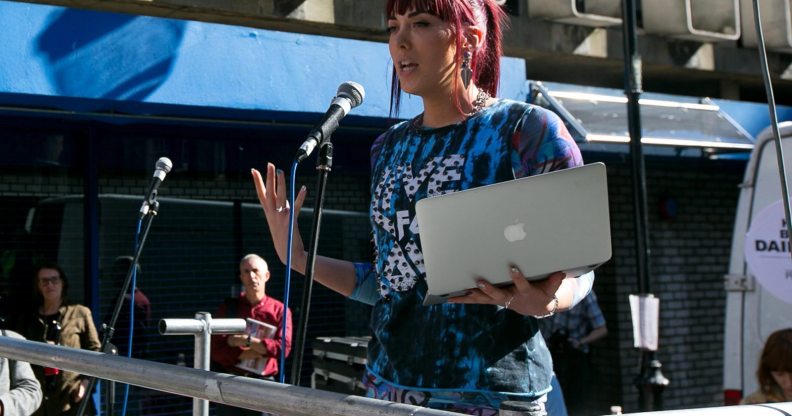
Trans journalist Paris Lees (Photo by Dan Dennison/Getty Images)
Trans activist Paris Lees has clashed with veteran journalist Nick Robinson over his focus on hypothetical fears over transgender people in an podcast aired earlier this month.
Lees joined the former political editor of BBC news for his podcast Political Thinking to discuss her experiences and work on trans representation in the media.
After a discussion of Lees’ life and her work as a journalist and trans activist, Robinson asked Lees about the potential legal changes to trans rights in the UK.
The potential reforms to the Gender Recognition Act focus on the right to self-identify rather than requiring a doctor’s approval.
Many transgender campaigners have stated their concerns that the current requirements for a Gender Recognition Certificate, which includes a two-year waiting period, are prohibitive.
However, there has been a significant backlash to the potential of trans people being able to self-identify, with much of the concern focusing on potential attacks on women and children in bathrooms.
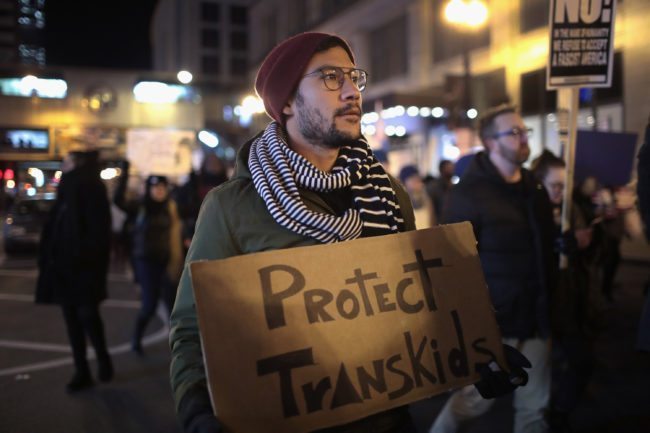
(Photo by Scott Olson/Getty Images)
In the podcast Robinson said: “The general concern is whether it’s about male sexual offenders being transferred to women’s prisons or whether it’s about blokes having a sex change and going into girls changing rooms in schools, you think the law change won’t make any difference.”
Lees replied: “Blokes having a sex change and going into the changing room in girls schools?” Do you really think that’s happening?”
Lees challenged Robinson on his assumption that adults of any gender would be going to school changing rooms, before criticising his language and idea that any change in the law would affect toilet and changing room use.
She said: “Hang on a minute, do you know who you’re talking about? when you meet these kids they’re not ‘blokes who have had a sex change’, they’re transgender girls.
“I think that the mums and dads that love these kids and support them would be really offended to hear you talk about it in those terms.”
Lees continued: “I’ve been using the women’s toilets for the last ten years without causing anybody any problems whatsoever, this change in the law won’t make any difference as there aren’t any laws about who can use toilets and changing rooms.”
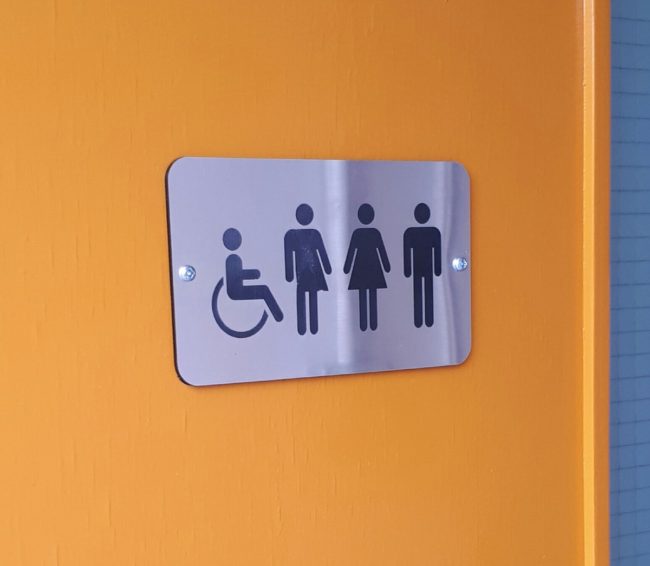
A gender neutral bathroom (Getty Images)
Robinson apologised for his language and then insisted that “human rights law” could be affected by the right of trans people to self-identify as their gender, and that this could be exploited by predators.
There are currently no laws either within the UK or on a European level that enforce who can access spaces such as toilets and changing rooms based on gender, nor any that could hypothetically be used in order to enable predatory behaviour based on changing gender.
Lees highlighted that multiple countries, including Argentina, Denmark and Ireland, already operate under a policy of self-identification for trans people.
She said: “There are millions of people living in countries that have this and there is no evidence that this has caused any problems whatsoever, do your research.
“I think it’s this bogeyman idea, this big bad thing that’s going to happen and there wasn’t any evidence for that.”
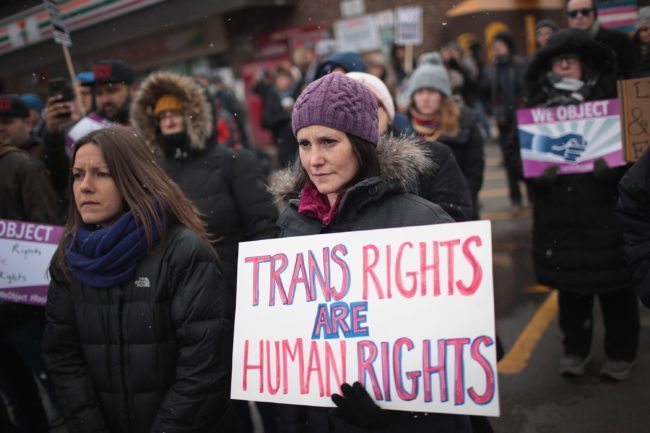
(Photo by Scott Olson/Getty Images)
Lees then criticised Robinson for focusing on the hypothetical fears people hold about transgender people rather than focusing on the real issues affecting trans people.
She said: “You’re posing the question of what if this happens, what if that happens, what if the fox gets in with the pigeons, there’s no evidence that this has happened or will happen.
“If people are going to seek to try to justify discrimination against people like me based on zero evidence then I am going to get upset about that.”
Robinson stated that he was simply asking questions that had been raised and was repeating the concerns of other people. He then stated that even within a debate, you could not shut down or delegitimise people’s concerns.
“No you absolutely can,” Lees said in response.
“If I were to say to you can black people be uber drivers because there’s a fear that some of them are rapists, and I’m just repeating something that someone said, would you say that would be a legitimate question?”
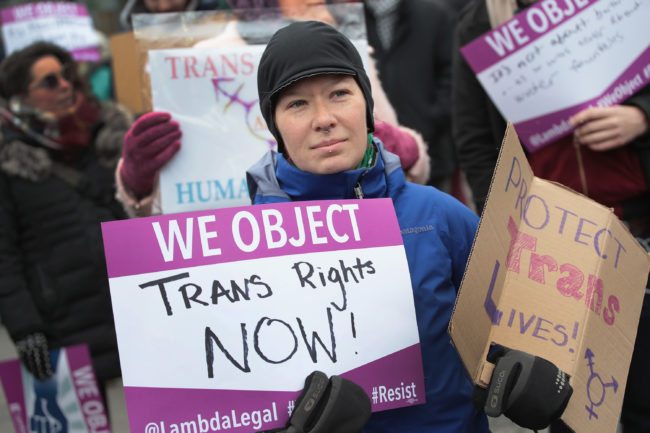
(Getty)
Lees expressed her frustration with the scaremongering tone taken by the veteran journalist and the repeated focus on people’s fears about trans people.
“I’m really angry if I’m honest that you’re framing it in this way, Nick,” she said.
“The Gender Recognition Act is about me being able to change my documentation.
“It doesn’t have any effect on anybody else. It’s about me being able to change my birth certificate and private documentation. It doesn’t have any effect on toilets, changing rooms, prisons is a complicated issue but would always be done on a case by case example.”
“There are women who have sexually assaulted women, what are we going to do, ban lesbians from changing rooms?”
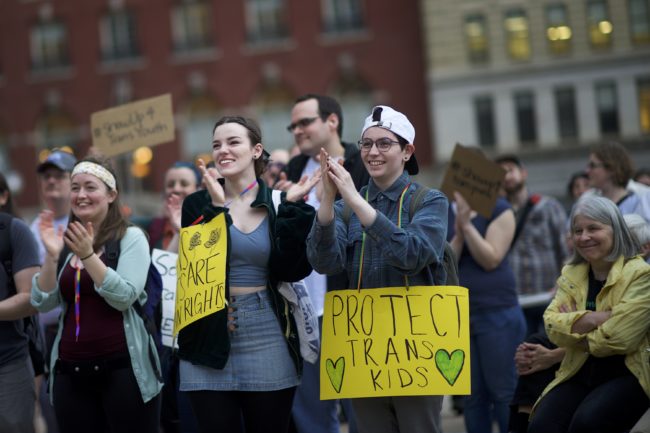
(Getty)
Lees continued: “People may have fears but that’s not a basis for discriminating against a whole class of people.
“There are bad people from all different walks of life but I do think that it’s really important to focus on the facts when we’re talking about this.”
Writing exclusively for PinkNews, Lees expressed her surprise at the quality of the interview with the veteran journalist.
She said: “I was astounded that a journalist of his calibre seems to have accepted such sensationalised stereotypes at face value, expressed in the language of the gutter press.
“Sex change” is not a medical term or one that I, or any trans person I know, would use to refer to the various complex processes of medical transition.
She continued: “It’s rude, misleading and reductive: like referring to a mastectomy as a “tit chop”.
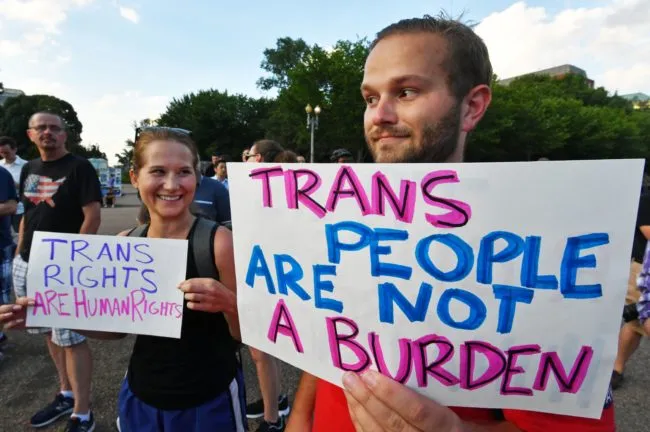
(Getty)
After the interview had formally concluded, a discussion between Robinson and Lees continued where Lees said she had felt ‘interrogated’ by Robinson’s line of questioning.
“I feel like you’re interrogating me, why should I be here to be interrogated? I’m not a politician that’s is here to defend something,” she said.
“I’m literally just saying that trans people should be treated with respect I feel like you’re grilling me.”
Robinson justified his questioning by stating that when anyone argues for a substantial change in society, people will have questions and objections.
Lees replied by saying that the media had a significant role to play in the public perception of trans people, and that it was important to amplify trans voices.
She said: “The whole reason we’re having this debate now is because people like me are saying you guys are getting it wrong and we’re changing the narrative, and the things you want to talk about are wrong.”

